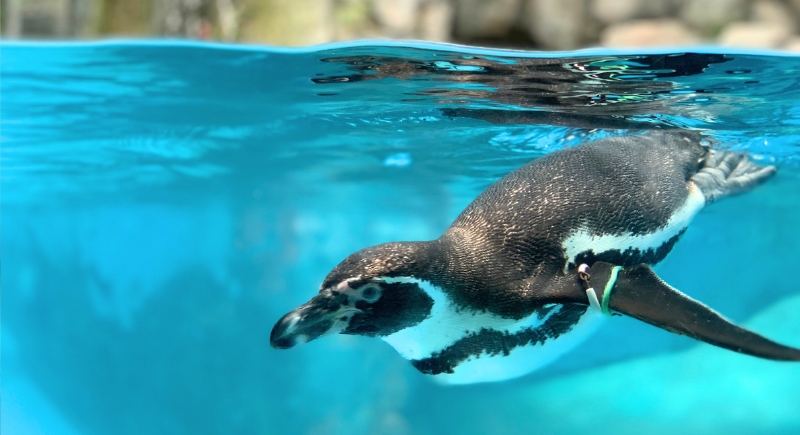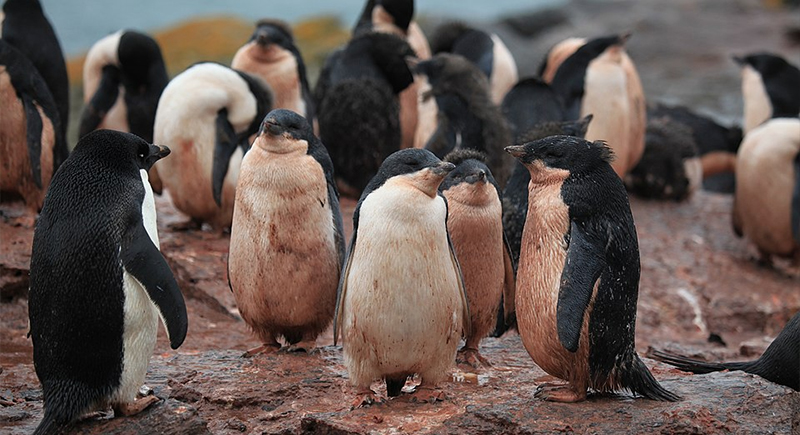It Sounds Like a Joke, but Penguin Poop Is Actually Cooling Down Antarctica
Scientists have discovered something far less glamorous about penguins that might play a role in fighting climate change: their poop. As odd as it sounds, penguin guano isn’t just smelly waste. It releases gases that may help create clouds, and those clouds could influence how much sunlight reaches Antarctica.
Guano is loaded with nutrients like nitrogen and phosphorus, which make it an excellent fertilizer. More surprisingly, scientists have found that it also produces ammonia, a gas that rises into the atmosphere. When ammonia combines with other molecules, it forms clusters that grow into tiny particles called aerosols. These aerosols act as seeds for cloud formation by blocking sunlight and reducing surface heating over land and water.
Researchers from the University of Helsinki tested this process at Argentina’s Marambio Base on Seymour Island. Over three summer months, they tracked wind direction, ammonia levels, and the number of aerosols in the air. When breezes carried air from a nearby colony of 60,000 Adélie penguins, ammonia levels spiked as high as 13.5 parts per billion, nearly a thousand times higher than Antarctica’s natural background.
Particle counters showed matching increases in aerosols, and at times fog or low-lying clouds developed above the icy terrain. Even after the penguins left, ammonia continued to rise from the guano left behind in the soil, showing that its influence lasts well beyond the breeding season.
Penguin-Plankton Connection

Image via Getty Images/garytamin
Penguins aren’t working alone in this process. Their ammonia-rich emissions interact with sulfur-based gases from phytoplankton, the microscopic algae that bloom in surrounding waters. Together, these inputs accelerate aerosol production and cloud growth. Scientists note that the overlap between penguin nesting season and high phytoplankton activity may strengthen this effect, though the exact timing varies by region.
Antarctica is one of the cleanest places on Earth, with few natural sources of particles that spark cloud formation. That makes penguin guano emissions particularly significant compared with other regions. Without penguins and phytoplankton contributing, the skies above Antarctica would have far fewer clouds, leaving more solar radiation to heat up dark ocean water and melt sea ice.
Small Poops, Big Impact
The idea of poop shaping the climate may sound funny, but it highlights how overlooked details in nature can affect global systems. Research in other polar regions has suggested that seabird guano can also contribute to aerosol formation, though the evidence is less direct than in Antarctica. Still, the Antarctic findings support the idea that guano-driven aerosols can have a local cooling effect, especially over open water where heat absorption is strongest.
However, the role of clouds in climate is complicated. Over snow and ice, extra cloud cover can sometimes trap heat instead of blocking it. That means the impact depends on where the clouds form and drift. This uncertainty makes understanding penguin-driven aerosols even more important, especially as Antarctica warms at nearly twice the global average. Scientists emphasize that more fieldwork is needed to measure the true extent of cooling from penguin poop and how widespread the effect is across the continent.
Why It Matters

Image via Wikimedia Commons/Liam Quinn
A drop in penguin numbers would mean more than the loss of a familiar Antarctic bird. Sea ice decline already makes breeding harder, and shifts in the ocean are cutting into the krill and fish they rely on. Fewer penguins also mean less ammonia is released into the air, and with that, fewer particles around which clouds can form. Researchers point out that this could change local cloud cover and warming, though it remains a theory that needs more study.
What stands out is that penguin colonies are part of the climate system itself. Their waste influences how much sunlight the region reflects back into space or absorbs into dark water. Protecting penguins isn’t only about saving a species—it’s about keeping an atmospheric link that helps regulate conditions in one of the most fragile places on Earth.